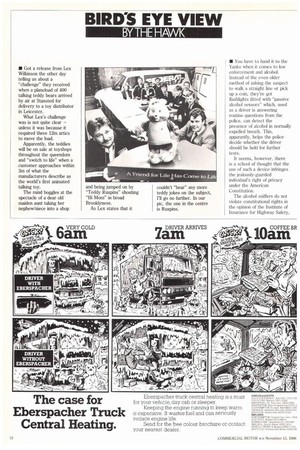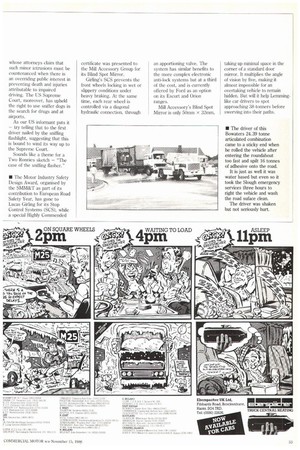• Got a release from Lex Wilkinson the other day
Page 64

Page 65

If you've noticed an error in this article please click here to report it so we can fix it.
telling us about a "challenge" they received when a planeload of 400 talking teddy hears arrived by air at Stansted for delivery to a toy distributor in Leicester.
What Lex's challenge was is not quite clear — unless it was because it required three 12m artics to move the load.
Apparently, the teddies will be on sale at toyshops throughout the queendom and "switch to life" when a customer approaches within 3m of what the manufacturers describe as the world's first animated talking toy.
The mind boggles at the spectacle of a dear old maiden aunt taking her nephew/niece into a shop and being jumped on by "Teddy Ruxpins" shouting "Hi Mom" in broad Brooklynese.
As Lex states that it couldn't "bear" any more teddy jokes on the subject, I'll go no further_ In our pic, the one in the centre is Ruxpins. • You have to hand it to the Yanks when it comes to law enforcement and alcohol. Instead of the even older method of asking the suspect to walk a straight line or pick up a coin, they're got flashlights fitted with "passive alcohol sensors" which, used as a driver is answering routine questions from the police, can detect the presence of alcohol in normally expelled breath. This, apparantly, helps the police decide whether the driver should be held for further tests.
It seems, however, there is a school of thought that the use of such a device infringes the jealously-guarded individual's right of privacy under the American Constitution.
The alcohol sniffers do not violate constitutional rights in the opinion of the Institute of Insurance for Highway Safety, whose attorneys claim that such minor intrusions must be countenanced when there is an overriding public interest in preventing death and injuries attributable to impaired driving. The US Supreme Court, moreover, has upheld the right to use sniffer dogs in the search for drugs and at airports.
As our US informant puts it — try telling that to the first driver nailed by the sniffing flashlight, suggesting that this is bound to wind its way up to the Supreme Court.
Sounds like a theme for a Two Ronnies sketch — "The case of the sniffing flasher."
• The Motor Industry Safety Design Award, organised by the SMM&T as part of its contribution to European Road Safety Year, has gone to Lucas Girling for its Stop Control Systems (SCS), while a special Highly Commended certificate was presented to the Mill Accessory Group for its Blind Spot Mirror.
Girling's SCS prevents the front wheels locking in wet or slippery conditions under heavy braking. At the same time, each rear wheel is controlled via a diagonal hydraulic connection, through an apportioning valve. The system has similar benefits to the more complex electronic anti-lock systems but at a third of the cost, and is currently offered by Ford as an option on its Escort and Orion ranges.
Mill Accessory's Blind Spot Mirror is only 50min x 32mm, taking up minimal space in the corner of a standard door mirror. It multiplies the angle of vision by five, making it almost impossible for an overtaking vehicle to remain hidden. But will it help Lemminglike car drivers to spot approaching 38-tonners before swerving into their paths.
• The driver of this Bowaters 24.39 tonne articulated combination came to a sticky end when he rolled the vehicle after entering the roundabout too fast and spilt 16 tonnes of adhesive onto the road.
It is just as well it was water based but even so it took the Slough emergency services three hours to right the vehicle and wash the road suface clean.
The driver was shaken but not seriously hurt.






























































































